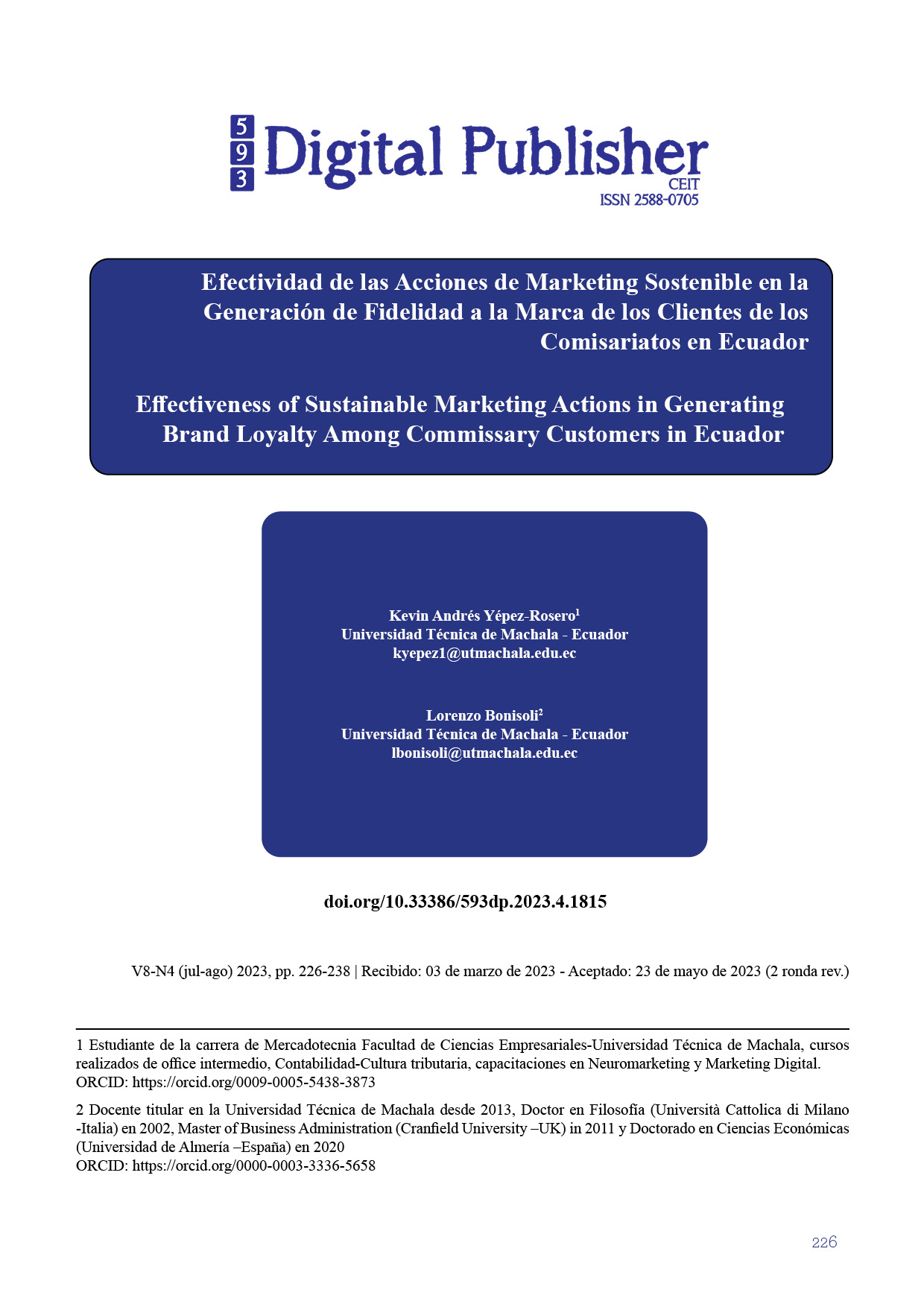Efectividad de las Acciones de Marketing Sostenible en la Generación de Fidelidad a la Marca de los Clientes de los Comisariatos en Ecuador.
Contenido principal del artículo
Resumen
Actualmente, las empresas se encuentran implicadas en ofertar artículos sostenibles los cuales manifiestan cualidades que los hacen diferentes de los productos tradicionales a través de empaques diferenciados en donde muestran certificación medio ambiental validando de esta manera su interés por el cuidado y bienestar al medio ambiente, como resultado de esto nace lo que se conoce como desarrollo sostenible termino basado en un concepto de desarrollo socio económico cuya finalidad es garantizar una vida de calidad y plenitud para todos. Muchas organizaciones se encuentran implicadas en ofertar productos sostenibles, en Ecuador lo hacen bajo los comisariatos o conocidos también como hipermercados, estos que pertenecen al sector minorista y atraen a las personas de distintas condiciones económicas.
Dicho esto, el presente estudio tiene como objetivo principal; analizar la percepción y sensibilidad de los consumidores de los comisariatos en Ecuador frente a la aplicación de acciones sustentables que demuestren su interés por el bienestar del medio ambiente. Para llevarlo a cabo, se realizó bajo un enfoque cuantitativo, por medio de una investigación de tipo exploratoria y empírica, y para analizar los datos se utilizó el método PLS-SEM, donde se manifestó que las prácticas de sostenibilidad por parte de las empresas son efectivas para la creación de valor y lealtad a largo plazo en los consumidores.
Descargas
Detalles del artículo

Esta obra está bajo una licencia internacional Creative Commons Atribución-NoComercial-CompartirIgual 4.0.
1. Derechos de autor
Las obras que se publican en 593 Digital Publisher CEIT están sujetas a los siguientes términos:
1.1. 593 Digital Publisher CEIT, conserva los derechos patrimoniales (copyright) de las obras publicadas, favorece y permite la reutilización de las mismas bajo la licencia Licencia Creative Commons 4.0 de Reconocimiento-NoComercial-CompartirIgual 4.0, por lo cual se pueden copiar, usar, difundir, transmitir y exponer públicamente, siempre que:
1.1.a. Se cite la autoría y fuente original de su publicación (revista, editorial, URL).
1.1.b. No se usen para fines comerciales u onerosos.
1.1.c. Se mencione la existencia y especificaciones de esta licencia de uso.
Citas
Abuzaid, H., Almashhour, R., Mohammed, A., & Beheiry, S. (2022). Assessment of the Perception of Sustainability for Occupants of Residential Buildings: A Case Study in the UAE. Journal Buildings, 12(7), 994. https://doi.org/10.3390/buildings12070994
Ajmal, M. M., Khan, M., Hussain, M., & Helo, P. (2018). Conceptualizing and incorporating social sustainability in the business world. Int. J. Sustainable Dev. World Ecol., 25(4), 327–339. https://doi.org/10.1080/13504509.2017.1408714
Blaise, I. I. P., Mpinganjira, M., & Roberts-Lombard, M. (2019). Modelling green customer loyalty and positive word of mouth: Can environmental knowledge make the difference in an emerging market? International Journal of Emerging Markets, 15(3), 405–426. https://doi.org/10.1108/IJOEM-09-2018-0489
Borges, N., & Janissek-Muniz, R. (2021). Perceived value of organizational foresight processes: effects of the illusion of control and individual foresight. BBR, Braz. Bus. Rev., 18(5), 516–536. https://doi.org/10.15728/bbr.2021.18.5.3
Chrisjatmiko, K. (2018). Towards green loyalty. the influences of green perceived risk, green image, green trust and green satisfaction. IOP Conference Series: Earth and Environmental Science., 106(1), 012085. https://doi.org/10.1088/1755-1315/106/1/012085
Cope, M. R., Kernan, A. R., Sanders, S. R., & Ward, C. (2022). Social Sustainability?: Exploring the Relationship between Community Experience and Perceptions of the Environment. Sustainability, 14(3). https://doi.org/10.3390/su14031935
Fiallos, G. (2021). La Correlación de Pearson y el proceso de regresión por el Método de Mínimos Cuadrados. Ciencia Latina Revista Científica Multidisciplinar, 5(3), 2491–2509. https://doi.org/10.37811/cl_rcm.v5i3.466
Gerekan, B., Pehlivan, A., & Koçan, M. (2019). The Effect of Firm Growth on Brand Value: Evidence from Brand Finance Turkey-100. Asian Economic and Financial Review, 9(9), 1067–1076. https://doi.org/10.18488/journal.aefr.2019.99.1067.1076
Gupta, S., Gallear, D., Rudd, J., & Foroudi, P. (2020). The impact of brand value on brand competitiveness. J. Bus. Res., 112, 210–222. https://doi.org/10.1016/j.jbusres.2020.02.033
Juliana, Djakasaputra, A., & Pramono, R. (2020). Green perceived risk, green viral communication, green perceived value against green purchase intention through green satisfaction. Journal industrial engineering & management research ( JIEMAR), 1(2), 124–139. https://doi.org/10.7777/jiemar.v1i2
Junior, S. B., Martínez, M. P., Correa, C. M., Moura-Leite, R. C., & da Silva, D. (2019). Greenwashing effect, attitudes, and beliefs in green consumption. RAUSP Management Journal, 54(2), 226–241. https://doi.org/10.1108/rausp-08-2018-0070
Klarin, T. (2018). The Concept of Sustainable Development: From its Beginning to the Contemporary Issues. Zagreb International Review of Economics and Business, 21(1), 67–94. https://doi.org/10.2478/zireb-2018-0005
Kowalska, M. (2020). SME Managers’ Perceptions of Sustainable Marketing Mix in Different Socioeconomic Conditions—A Comparative Analysis of Sri Lanka and Poland. Sustain. Sci. Pract. Policy, 12(24), 10659. https://doi.org/10.3390/su122410659
Kruger, S. D., Zanin, A., Três, N., & Magro, C. B. D. (2021). Práticas de sustentabilidade adotadas por empresas industriais. Rev. Adm. UFSM, 14, 1140–1159. https://doi.org/10.5902/1983465963908
Kucharska, W., Flisikowski, K., & Confente, I. (2018). Do global brands contribute to the economy of their country of origin? A dynamic spatial approach. Journal of Product & Brand Management, 27(7), 768–780. https://doi.org/10.1108/JPBM-10-2017-1641
Lakatos, E.-S., Nan, L.-M., Bacali, L., Ciobanu, G., Ciobanu, A.-M., & Cioca, L.-I. (2021). Consumer Satisfaction towards Green Products: Empirical Insights from Romania. Sustainability, 13(19), 15. https://doi.org/10.3390/su131910982
Laukkanen, M., & Tura, N. (2022). Sustainable value propositions and customer perceived value: Clothing library case. J. Clean. Prod., 378, 134321. https://doi.org/10.1016/j.jclepro.2022.134321
Lin, W. L., Ho, J. A., Sambasivan, M., Yip, N., & Mohamed, A. bin. (2021). Influence of green innovation strategy on brand value: The role of marketing capability and R&D intensity. Technol. Forecast. Soc. Change, 171, 120946. https://doi.org/10.1016/j.techfore.2021.120946
Lin, Y.-H., Lee, T.-H., & Wang, C.-K. (2021). Influence Analysis of Sustainability Perceptions on Sense of Community and Support for Sustainable Community Development in Relocated Communities. Int. J. Environ. Res. Public Health, 18(22). https://doi.org/10.3390/ijerph182212223
Mofidi Chelan, M., Alijanpour, A., Barani, H., Motamedi, J., Azadi, H., & van Passel, S. (2018). Economic sustainability assessment in semi-steppe rangelands. Sci. Total Environ., 637–638, 112–119. https://doi.org/10.1016/j.scitotenv.2018.04.428
Moisescu, O. I., Gică, O. A., Müller, V. O., & Müller, C. A. (2019). Can Corporate Fairness towards Public Authorities Enhance Customer Loyalty? A Multi-Sectorial Investigation in a Developing Country. Sustain. Sci. Pract. Policy, 12(1), 187. https://doi.org/10.3390/su12010187
Moisescu, O.-I. (2018). From perceptual corporate sustainability to customer loyalty: a multi-sectorial investigation in a developing country. Economic Research-Ekonomska Istraživanja, 31(1), 55–72. https://doi.org/10.1080/1331677X.2017.1421998
Nanggong, A., & Rahmatia, R. (2019). Perceived Benefit, Environmental Concern and Sustainable Customer Behavior on Technology Adoption. The Asian Journal of Technology Management (AJTM), 12(1), 31–47. https://doi.org/10.12695/ajtm.2019.12.1.3
Pahlevi, M. R., & Suhartanto, D. (2020). The integrated model of green loyalty: Evidence from eco-friendly plastic products. J. Clean. Prod., 257, 120844. https://doi.org/10.1016/j.jclepro.2020.120844
Piper, L., de Cosmo, L. M., Sestino, A., Giangrande, A., Stabili, L., Longo, C., & Guido, G. (2021). Perceived social welfare as a driver of green products consumption: Evidences from an integrated multi-trophic aquaculture production. Current Research in Environmental Sustainability, 3, 100081. https://doi.org/10.1016/j.crsust.2021.100081
Rivera-Ferre, M. (2022). Climate change is not equal to all: The contribution of feminist studies to climate change research. Mètode Science Studies Journal, 12, 131–135. https://doi.org/10.7203/metode.12.20508
Severo, E. A., Guimarães, J. C. F. de, Dellarmelin, M. L., & Ribeiro, R. P. (2019). The Influence of Social Networks on Environmental Awareness and the Social Responsibility of Generations. BBR - Brazilian Business Review, 16(5), 500–518. https://doi.org/10.15728/bbr.2019.16.5.5
Silva de Souza, D. E., & Baldanza, R. F. (2018). The e-consumer in light of the perceived value theory: A study on the acceptance of mobile commerce. Base Revista de Administração e Contabilidade da UNISINOS, 15(3), 238–253. https://www.redalyc.org/articulo.oa?id=337260224006
Strenitzerová, M., & Gaňa, J. (2018). Customer Satisfaction and Loyalty as a Part of Customer-Based Corporate Sustainability in the Sector of Mobile Communications Services. Sustain. Sci. Pract. Policy, 10(5), 1657. https://doi.org/10.3390/su10051657
Sun, H., Rabbani, M. R., Ahmad, N., Sial, M. S., Cheng, G., Zia-Ud-Din, M., & Fu, Q. (2020). CSR, Co-Creation and Green Consumer Loyalty: Are Green Banking Initiatives Important? A Moderated Mediation Approach from an Emerging Economy. Sustain. Sci. Pract. Policy, 12(24), 10688. https://doi.org/10.3390/su122410688
Trivedi, K., Trivedi, P., & Goswami, V. (2018). Sustainable marketing strategies: Creating business value by meeting consumer expectation. International Journal of Management, Economics and Social Sciences., 7(2), 186–205. https://www.econstor.eu/bitstream/10419/180785/1/full-3.pdf
Westin, L., Hallencreutz, J., & Parmler, J. (2022). Sustainable Development as a Driver for Customer Experience. Sustainability, 14(6), 3505. https://doi.org/10.3390/su14063505



